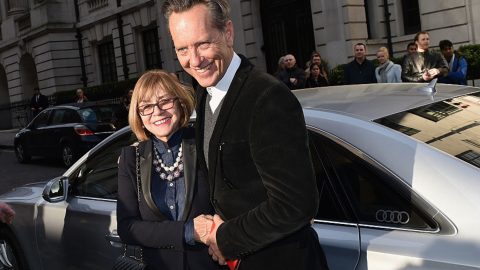
Former Eurovision contestant Daði Freyr appeared at Eurovision 2023 last night (May 13), and fans loved his “epic version” of Atomic Kitten during the final.
During one segment of the show, previous Eurovision contestants paid tribute to Liverpool’s music history during a song medley and Freyr, who represented Iceland at the competition in 2021, appeared in this part to cover Atomic Kitten’s 2000 hit ‘Whole Again’.
Fans on social media felt it was one of the best of the night, with one writing that the cover was “incredible” and another saying it was an “epic version”.
Check out the cover and more fan reaction below:
I made a cover of the Atomic Kitten song Whole Again!
It’s out in a few hours!
Also tune in to @Eurovision tonight because I’m gonna be performing live in front of a Eurovision audience for the first time!@bbceurovision pic.twitter.com/pBr9f9sp0m— Daði Freyr
(@dadimakesmusic) May 13, 2023
Dadi can always make us whole again! #Eurovision pic.twitter.com/ScmxlsGObt
— Eurovision Song Contest (@Eurovision) May 13, 2023
How has Daði Freyr made Whole Again such an epic version
obsessed
#Eurovision #Eurovision2023 pic.twitter.com/ga5qr7IZZ6
— Wando (@Wandoful) May 13, 2023
WHOLE AGAIN. Bloody brilliant.
Slightly different from the Atomic Kitten tape version I had back in the day…#Eurovision #Eurovision2023— Olivia-Anne Cleary (@OliviaACleary) May 13, 2023
Dadi Freyr singing ‘Whole Again’ was an inspired choice #Eurovision #Eurovision2023 pic.twitter.com/qccbSTCm1C
— Claire Simpson
(@ClaireSimpsonPR) May 13, 2023
I did not know Iceland’s Dadi doing Whole Again was what I needed to feel complete, but there it is. #Eurovision
— James Ball (@jamesrbuk) May 13, 2023
Ahead of the final yesterday, Freyr spoke to NME about the shift in attitudes towards the Song Contest, as well what to expect from his performance and his upcoming album.
Freyr is no stranger to the contest, having been set to compete with the viral song ‘Think About Things’ in 2020 before the event was pulled due to COVID lockdown, and eventually represented Iceland at Eurovision 2021 with his track ‘10 Years’.
“It was fun, although one of members got COVID and we had to quarantine, which was pretty boring,” he said of his last appearance at the show, speaking to NME from backstage. “I never would have written ‘10 Years’ or ‘Think About Things’ if it wasn’t for Eurovision, and it’s a huge stepping stone towards bigger things if you really capitalise on it. It’s a huge ad for me as a performer.”
“I’m doing a cover by a Liverpool band,” he teased of his performance ahead of the show. “I get one and a half minutes, so I’m just trying to squeeze as much of me into that as I can. The cover is also being released today.”
With a cult fan base and having appeared at indie festivals and showcase events, Freyr has enjoyed being part of the increased credibility of Eurovision in recent years.
“People are just allowed a little more to like different things,” he said. “It’s not as cool anymore to be a hater. It’s just a super-fun thing, and I think more people are just allowing themselves to enjoy it. Before there were a lot more people who made it a point to hate Eurovision.”
You can watch the full interview here:
Sweden were crowned overall winners at Eurovision Song Contest last night, with a win of 583 points.
Sweden were the bookies favourite to win ahead of the final in Liverpool, with Loreen’s song ‘Tattoo’ having odds of 4/9 on bet365 to win on the day of the grand finale.
The win made Eurovision history, with Loreen becoming the first woman to win the competition twice, following her victory in 2012 with the track ‘Euphoria’.
After the jury votes, Sweden stood in first place at 340 points. After the public vote, this increased at 583. Finland and Israel came in second and third place respectively.
Responding to her win afterwards, Loreen said: “This feels amazing. I’m started to melt! It was surreal in the beginning I’m like ‘what does happened?!’ …It’s sinking in, it’s so beautiful and I’m so thankful.”
Asked about the differences between she last won and now, she said: “It’s so much bigger now and I’m so happy about it…I love this community…and it’s going to grow, even bigger!”

This year’s instalment of the contest took place in Liverpool. While Ukraine won last year and would normally host under the rules of the competition, the ongoing political conflict meant it was held in the UK, who were runners up last year with Sam Ryder.
However, the opening segment of the finale was dedicated to Ukraine, with their 2022 entry Kalush Orchestra opening the contest with an emotive rendition of their winning song, ‘Stefania’.
The opening also saw the band joined by musicians and famous figures from afar. During one segment of the song, it cut to a clip of Ryder playing guitar on the song from on top of Liverpool’s Liver Building.
Other contributions via video included ones from Joss Stone, Miss Banks, Andrew Lloyd Webber and the Princess of Wales, who played piano on the song.
Ryder then later returned to the stage after the finalists to perform his latest single ‘Mountain’ with Taylor making a surprise appearance on drums. Ryder last joined Queen on stage for a rendition of ‘Somebody To Love’ at the Foo Fighter’s Taylor Hawkins tribute concert.

Elsewhere, the show featured a segment where previous Eurovision contestants paid tribute to Liverpool’s music history during a song medley as well as a special video message from ABBA’s Björn Ulvaeus who paid tribute to Eurovision and its importance in ABBA’s career.
The UK’s entry, Mae Martin, closed the finalist’s performances with her entry, ‘I Wrote A Song‘. The UK finished second from last with 24 points and Mae has since responded to the disappointing result with a statement.
Meanwhile, some fans were unhappy with Sweden winnnig, with many wanting Finland’s Käärijä to win with his dance-inspired song, ‘Cha Cha Cha’. You can check out more of the fan reaction to the results here.
Keep checking back on nme.com for more Eurovision updates
The post Eurovision 2023: Fans love Daði Freyr’s “epic version” of Atomic Kitten’s ‘Whole Again’ appeared first on NME.









